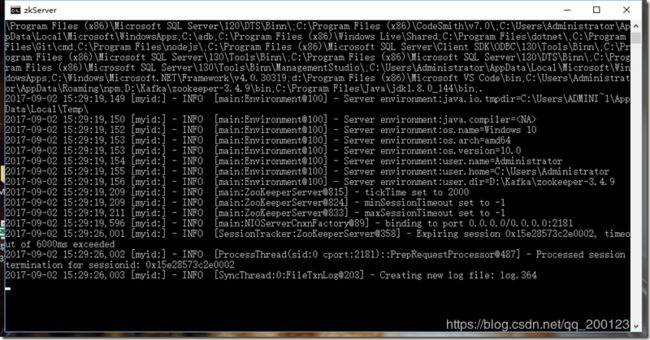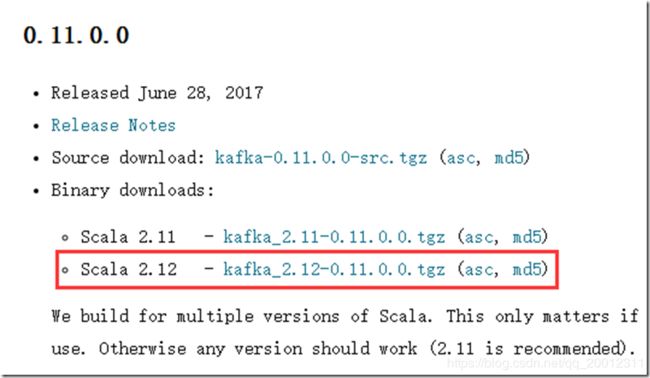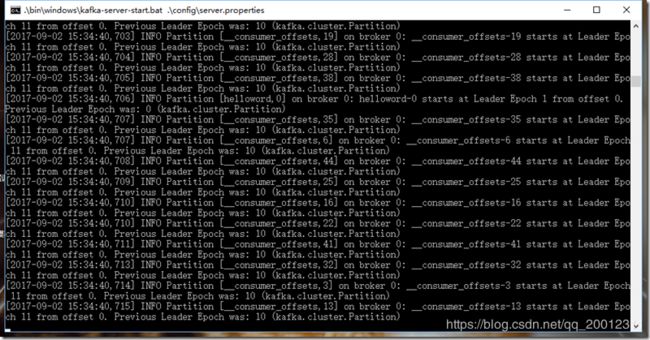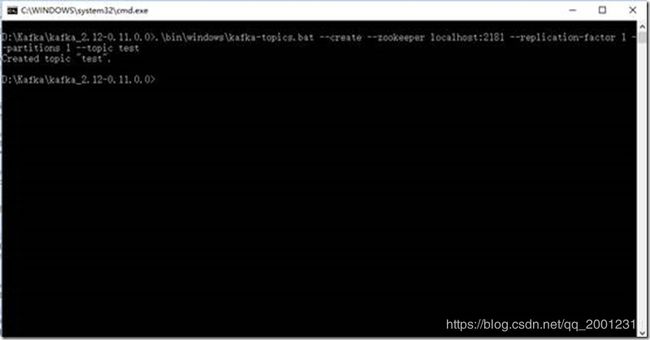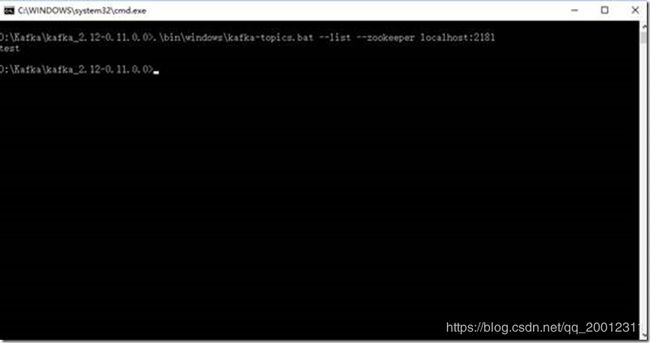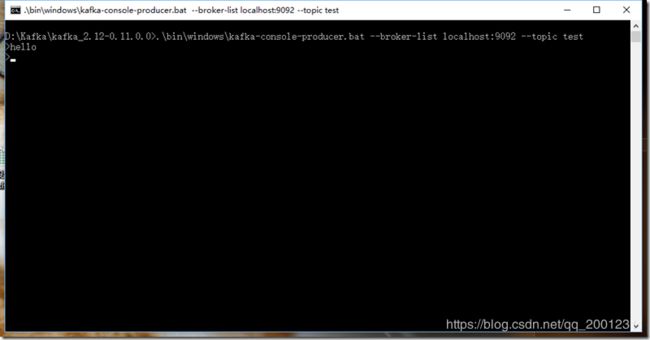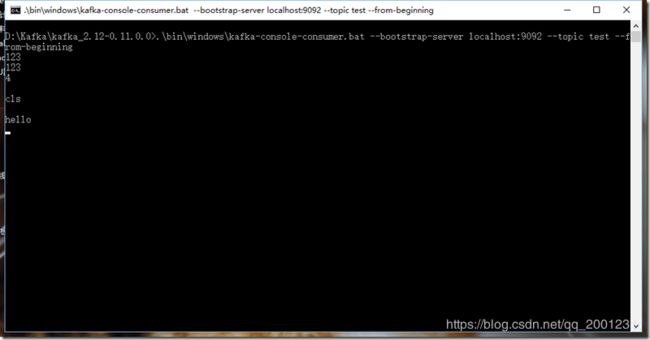在Windows安装运行Kafka
参考网址:
https://www.cnblogs.com/flower1990/p/7466882.html
https://blog.csdn.net/cx2932350/article/details/78870135
在Windows安装运行Kafka
一、安装JAVA JDK
1、下载安装包
http://www.oracle.com/technetwork/java/javase/downloads/jdk8-downloads-2133151.html
注意:根据32/64位操作系统下载对应的安装包
2、添加系统变量:JAVA_HOME=C:\Program Files (x86)\Java\jdk1.8.0_144
二、安装ZooKeeper
1、 下载安装包
http://zookeeper.apache.org/releases.html#download
2、 解压并进入ZooKeeper目录,笔者:D:\privateSoft\zookeeper-3.4.13\conf
3、 将“zoo_sample.cfg”重命名为“zoo.cfg”
4、 打开“zoo.cfg”找到并编辑dataDir=D:\\privateSoft\\zookeeper-3.4.13\\tmp
#日志目录
dataLogDir=D:\\privateSoft\\zookeeper-3.4.13\\log
5、 添加系统变量:ZOOKEEPER_HOME=D:\privateSoft\zookeeper-3.4.13
6、 编辑path系统变量,添加路径:%ZOOKEEPER_HOME%\bin
7、 在zoo.cfg文件中修改默认的Zookeeper端口(默认端口2181)
8、 打开新的cmd,输入“zkServer.cmd“,运行Zookeeper
9、 命令行提示如下:说明本地Zookeeper启动成功
注意:不要关了这个窗口
三、安装Kafka
1、 下载安装包
http://kafka.apache.org/downloads
注意要下载二进制版本
2、 解压并进入Kafka目录,笔者:D:\Kafka\kafka_2.12-0.11.0.0
3、 进入config目录找到文件server.properties并打开
4、 找到并编辑log.dirs=D:\Kafka\kafka_2.12-0.11.0.0\kafka-logs
5、 找到并编辑zookeeper.connect=localhost:2181
6、 Kafka会按照默认,在9092端口上运行,并连接zookeeper的默认端口:2181
7、 进入Kafka安装目录D:\Kafka\kafka_2.12-0.11.0.0,按下Shift+右键,选择“打开命令窗口”选项,打开命令行,输入:
.\bin\windows\kafka-server-start.bat .\config\server.properties
注意:注意:不要关了这个窗口,启用Kafka前请确保ZooKeeper实例已经准备好并开始运行
四、测试
1、 创建主题,进入Kafka安装目录D:\Kafka\kafka_2.12-0.11.0.0,按下Shift+右键,选择“打开命令窗口”选项,打开命令行,输入:
.\bin\windows\kafka-topics.bat --create --zookeeper localhost:2181 --replication-factor 1 --partitions 1 --topic test
注意:不要关了这个窗口
查看主题输入:
.\bin\windows\kafka-topics.bat --list --zookeeper localhost:2181
2、 创建生产者,进入Kafka安装目录D:\Kafka\kafka_2.12-0.11.0.0,按下Shift+右键,选择“打开命令窗口”选项,打开命令行,输入:
.\bin\windows\kafka-console-producer.bat --broker-list localhost:9092 --topic test
注意:不要关了这个窗口
3、 创建消费者,进入Kafka安装目录D:\Kafka\kafka_2.12-0.11.0.0,按下Shift+右键,选择“打开命令窗口”选项,打开命令行,输入:
.\bin\windows\kafka-console-consumer.bat --bootstrap-server localhost:9092 --topic test --from-beginning
4、 大功告成
五、配置文件
1、zookeeper
# The number of milliseconds of each tick
tickTime=2000
# The number of ticks that the initial
# synchronization phase can take
initLimit=10
# The number of ticks that can pass between
# sending a request and getting an acknowledgement
syncLimit=5
# the directory where the snapshot is stored.
# do not use /tmp for storage, /tmp here is just
# example sakes.
#数据目录
dataDir=D:\\privateSoft\\zookeeper-3.4.13\\tmp\\zookeeper
#日志目录
dataLogDir=D:\\privateSoft\\zookeeper-3.4.13\\log
# the port at which the clients will connect
clientPort=2181
# the maximum number of client connections.
# increase this if you need to handle more clients
#maxClientCnxns=60
#
# Be sure to read the maintenance section of the
# administrator guide before turning on autopurge.
#
# http://zookeeper.apache.org/doc/current/zookeeperAdmin.html#sc_maintenance
#
# The number of snapshots to retain in dataDir
#autopurge.snapRetainCount=3
# Purge task interval in hours
# Set to "0" to disable auto purge feature
#autopurge.purgeInterval=1
2、kafka
# Licensed to the Apache Software Foundation (ASF) under one or more
# contributor license agreements. See the NOTICE file distributed with
# this work for additional information regarding copyright ownership.
# The ASF licenses this file to You under the Apache License, Version 2.0
# (the "License"); you may not use this file except in compliance with
# the License. You may obtain a copy of the License at
# http://www.apache.org/licenses/LICENSE-2.0
# Unless required by applicable law or agreed to in writing, software
# distributed under the License is distributed on an "AS IS" BASIS,
# WITHOUT WARRANTIES OR CONDITIONS OF ANY KIND, either express or implied.
# See the License for the specific language governing permissions and
# limitations under the License.
# see kafka.server.KafkaConfig for additional details and defaults
############################# Server Basics #############################
# The id of the broker. This must be set to a unique integer for each broker.
broker.id=0
############################# Socket Server Settings #############################
# The address the socket server listens on. It will get the value returned from
# java.net.InetAddress.getCanonicalHostName() if not configured.
# FORMAT:
# listeners = listener_name://host_name:port
# EXAMPLE:
# listeners = PLAINTEXT://your.host.name:9092
#listeners=PLAINTEXT://:9092
listeners = PLAINTEXT://127.0.0.1:9092
port=9092
advertised.listeners = PLAINTEXT://127.0.0.1:9092
# Hostname and port the broker will advertise to producers and consumers. If not set,
# it uses the value for "listeners" if configured. Otherwise, it will use the value
# returned from java.net.InetAddress.getCanonicalHostName().
#advertised.listeners=PLAINTEXT://your.host.name:9092
# Maps listener names to security protocols, the default is for them to be the same. See the config documentation for more details
#listener.security.protocol.map=PLAINTEXT:PLAINTEXT,SSL:SSL,SASL_PLAINTEXT:SASL_PLAINTEXT,SASL_SSL:SASL_SSL
# The number of threads that the server uses for receiving requests from the network and sending responses to the network
num.network.threads=3
# The number of threads that the server uses for processing requests, which may include disk I/O
num.io.threads=8
# The send buffer (SO_SNDBUF) used by the socket server
socket.send.buffer.bytes=102400
# The receive buffer (SO_RCVBUF) used by the socket server
socket.receive.buffer.bytes=102400
# The maximum size of a request that the socket server will accept (protection against OOM)
socket.request.max.bytes=104857600
############################# Log Basics #############################
# A comma separated list of directories under which to store log files
log.dirs=D:\\privateSoft\\kafka_2.11-2.1.1\\tmp\\kafka-logs
# The default number of log partitions per topic. More partitions allow greater
# parallelism for consumption, but this will also result in more files across
# the brokers.
num.partitions=1
# The number of threads per data directory to be used for log recovery at startup and flushing at shutdown.
# This value is recommended to be increased for installations with data dirs located in RAID array.
num.recovery.threads.per.data.dir=1
############################# Internal Topic Settings #############################
# The replication factor for the group metadata internal topics "__consumer_offsets" and "__transaction_state"
# For anything other than development testing, a value greater than 1 is recommended for to ensure availability such as 3.
offsets.topic.replication.factor=1
transaction.state.log.replication.factor=1
transaction.state.log.min.isr=1
############################# Log Flush Policy #############################
# Messages are immediately written to the filesystem but by default we only fsync() to sync
# the OS cache lazily. The following configurations control the flush of data to disk.
# There are a few important trade-offs here:
# 1. Durability: Unflushed data may be lost if you are not using replication.
# 2. Latency: Very large flush intervals may lead to latency spikes when the flush does occur as there will be a lot of data to flush.
# 3. Throughput: The flush is generally the most expensive operation, and a small flush interval may lead to excessive seeks.
# The settings below allow one to configure the flush policy to flush data after a period of time or
# every N messages (or both). This can be done globally and overridden on a per-topic basis.
# The number of messages to accept before forcing a flush of data to disk
#log.flush.interval.messages=10000
# The maximum amount of time a message can sit in a log before we force a flush
#log.flush.interval.ms=1000
############################# Log Retention Policy #############################
# The following configurations control the disposal of log segments. The policy can
# be set to delete segments after a period of time, or after a given size has accumulated.
# A segment will be deleted whenever *either* of these criteria are met. Deletion always happens
# from the end of the log.
# The minimum age of a log file to be eligible for deletion due to age
log.retention.hours=168
# A size-based retention policy for logs. Segments are pruned from the log unless the remaining
# segments drop below log.retention.bytes. Functions independently of log.retention.hours.
#log.retention.bytes=1073741824
# The maximum size of a log segment file. When this size is reached a new log segment will be created.
log.segment.bytes=1073741824
# The interval at which log segments are checked to see if they can be deleted according
# to the retention policies
log.retention.check.interval.ms=300000
############################# Zookeeper #############################
# Zookeeper connection string (see zookeeper docs for details).
# This is a comma separated host:port pairs, each corresponding to a zk
# server. e.g. "127.0.0.1:3000,127.0.0.1:3001,127.0.0.1:3002".
# You can also append an optional chroot string to the urls to specify the
# root directory for all kafka znodes.
zookeeper.connect=localhost:2181
# Timeout in ms for connecting to zookeeper
zookeeper.connection.timeout.ms=6000
############################# Group Coordinator Settings #############################
# The following configuration specifies the time, in milliseconds, that the GroupCoordinator will delay the initial consumer rebalance.
# The rebalance will be further delayed by the value of group.initial.rebalance.delay.ms as new members join the group, up to a maximum of max.poll.interval.ms.
# The default value for this is 3 seconds.
# We override this to 0 here as it makes for a better out-of-the-box experience for development and testing.
# However, in production environments the default value of 3 seconds is more suitable as this will help to avoid unnecessary, and potentially expensive, rebalances during application startup.
group.initial.rebalance.delay.ms=0
六、错误解决:
遇到问题:
1、
cmd运行:.\bin\windows\kafka-server-start.bat .\config\server.properties提示
错误: 找不到或无法加载主类 Files\Java\jdk1.8.0_101\lib\dt.jar;C:\Program
java环境由JRE换成JDK的话,需要修改kafka_2.12-1.0.0\bin\windows\kafka-run-class.bat文件。
具体修改内容是,将:
set COMMAND=%JAVA% %KAFKA_HEAP_OPTS% %KAFKA_JVM_PERFORMANCE_OPTS% %KAFKA_JMX_OPTS% %KAFKA_LOG4J_OPTS% -cp %CLASSPATH% %KAFKA_OPTS% %
改为:
set COMMAND=%JAVA% %KAFKA_HEAP_OPTS% %KAFKA_JVM_PERFORMANCE_OPTS% %KAFKA_JMX_OPTS% %KAFKA_LOG4J_OPTS% -cp "%CLASSPATH%" %KAFKA_OPTS% %
2、
java.nio.file.InvalidPathException: Illegal char < > at index 29: D:privateSoftkafka_2.11-2.1.1 mpkafka-logs\meta.properties.tmp
at sun.nio.fs.WindowsPathParser.normalize(WindowsPathParser.java:182)
at sun.nio.fs.WindowsPathParser.parse(WindowsPathParser.java:153)
at sun.nio.fs.WindowsPathParser.parse(WindowsPathParser.java:77)
at sun.nio.fs.WindowsPath.parse(WindowsPath.java:94)
at sun.nio.fs.WindowsFileSystem.getPath(WindowsFileSystem.java:255)
at java.io.File.toPath(File.java:2234)
at kafka.server.BrokerMetadataCheckpoint.read(BrokerMetadataCheckpoint.scala:60)
at kafka.server.KafkaServer$$anonfun$getBrokerIdAndOfflineDirs$1.apply(KafkaServer.scala:670)
at kafka.server.KafkaServer$$anonfun$getBrokerIdAndOfflineDirs$1.apply(KafkaServer.scala:668)
at scala.collection.IndexedSeqOptimized$class.foreach(IndexedSeqOptimized.scala:33)
at scala.collection.mutable.WrappedArray.foreach(WrappedArray.scala:35)
at kafka.server.KafkaServer.getBrokerIdAndOfflineDirs(KafkaServer.scala:668)
at kafka.server.KafkaServer.startup(KafkaServer.scala:209)
at kafka.server.KafkaServerStartable.startup(KafkaServerStartable.scala:38)
at kafka.Kafka$.main(Kafka.scala:75)
at kafka.Kafka.main(Kafka.scala)
解决方案:
原因:log.dirs的日志目录路径地址错误
错误的:log.dirs=D:\privateSoft\kafka_2.11-2.1.1\tmp\kafka-logs
正确的:log.dirs=D:\\privateSoft\\kafka_2.11-2.1.1\\tmp\\kafka-logs
3、
kafka.zookeeper.ZooKeeperClientTimeoutException: Timed out waiting for connection while in state: CONNECTING
at kafka.zookeeper.ZooKeeperClient$$anonfun$kafka$zookeeper$ZooKeeperClient$$waitUntilConnected$1.apply$mcV$sp(ZooKeeperClient.scala:268)
at kafka.zookeeper.ZooKeeperClient$$anonfun$kafka$zookeeper$ZooKeeperClient$$waitUntilConnected$1.apply(ZooKeeperClient.scala:264)
at kafka.zookeeper.ZooKeeperClient$$anonfun$kafka$zookeeper$ZooKeeperClient$$waitUntilConnected$1.apply(ZooKeeperClient.scala:264)
at kafka.utils.CoreUtils$.inLock(CoreUtils.scala:251)
at kafka.zookeeper.ZooKeeperClient.kafka$zookeeper$ZooKeeperClient$$waitUntilConnected(ZooKeeperClient.scala:264)
at kafka.zookeeper.ZooKeeperClient.
at kafka.zk.KafkaZkClient$.apply(KafkaZkClient.scala:1693)
at kafka.server.KafkaServer.kafka$server$KafkaServer$$createZkClient$1(KafkaServer.scala:348)
at kafka.server.KafkaServer.initZkClient(KafkaServer.scala:372)
at kafka.server.KafkaServer.startup(KafkaServer.scala:202)
at kafka.server.KafkaServerStartable.startup(KafkaServerStartable.scala:38)
at kafka.Kafka$.main(Kafka.scala:75)
at kafka.Kafka.main(Kafka.scala)
原因:ZooKeeper的日志路径没有配置
解决方案:
添加日志目录:
#日志目录
dataLogDir=D:\\privateSoft\\zookeeper-3.4.13\\log
